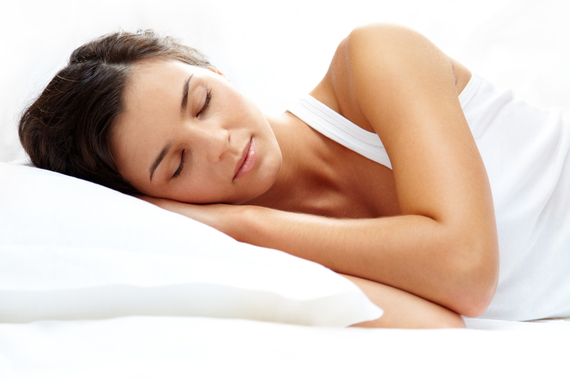
If you're feeling more tired than usual these days, you can blame the sun. Long summer days can interfere with sleep patterns because our natural circadian rhythms tell us to rise with the sun and rest in the evening. Sleep deprivation is nothing new to us, though, according to the Centers for Disease Control 40 percent of the American workforce is sleep deprived, getting fewer than six hours of sleep a night.
Our cultural lack of sufficient sleep does more than just keep Starbucks in business; it may be contributing to our ever-growing waistline. According to a study out of Harvard Medical School, sleep deprivation increases your risk for obesity.
I spoke with Lauren Hale, Ph.D., associate professor of preventive medicine in the public health program at Stony Brook University and board member of the National Sleep Foundation, about why sleep and obesity are so closely linked, and what we can do to create a healthier sleep habits... and not pack on sun-induced poundage.
Hormonal Hijinks
According to Dr. Hale, a lack of sleep takes a toll on our hunger hormones. Ghrelin, the hormone responsible for appetite stimulation in the body, is increased in times of insufficient sleep, while leptin, the hormone responsible for satiety, decreases. Your insatiable appetite may be a sign that it's time to schedule shuteye.
Fight hormones with hormones. Melatonin, the hormone responsible for regulating your sleep cycle is produced when the sun goes down. Since our days are no longer dictated solely by the status of the sun, Dr. Hale suggests dimming the lights in your home in the evening, and turning off lights in rooms you aren't using to help stimulate the pineal gland (which produces melatonin), and prepare your body for bed.
Snack Time
If you're awake, you're more likely to snack, which is yet another reason to call it a night. Dr. Hale suggests taking a two-hour eating hiatus before bed. Fat and protein rich foods take more digestive energy, which can keep your body from relaxing into slumber. Make the last meal of your day a small, carbohydrate-based meal, and give yourself ample time to digest before hitting the hay.
The Power of Choice
Not only are you hungrier when you're tired, you're less likely to make positive food choices. A recent study found that sleep deprived adolescents were more likely to choose high calorie/low nutrient foods than healthier alternatives.
If you've noticed the insomnia pounds piling on, skip the drive-thru and hit the stationary store. Keeping a journal to track eating and exercise habits has been shown to promote weight loss and healthy-weight maintenance.
Careful with Caffeine
Your morning latte may be the only thing differentiating you from an extra on The Walking Dead, but make sure you keep your caffeine fix limited to the AM hours. Caffeine can stay in your system for up to five hours. If you're craving a hot beverage before bed, opt for a naturally caffeine-free cup of herbal tea.
